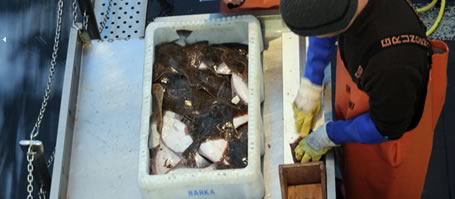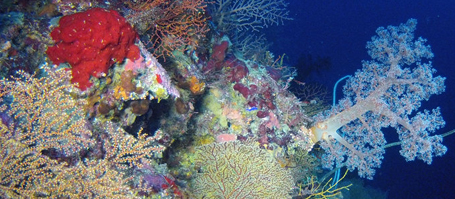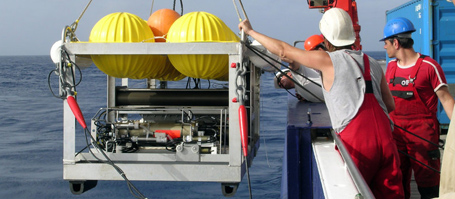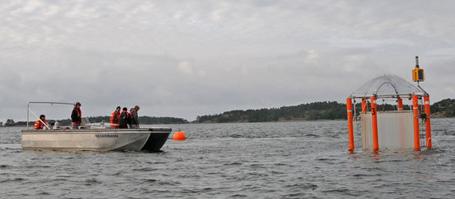The most well known of these in Germany is the environmental seal MSC, Marine Stewardship Council. The blue seal with the fish promises products from sustainable fishery and certifies fishery companies that practice environmentally friendly and sustainable fishery. The less well known seal FOS, Friend of the Sea, also provides some guidance for consumers when purchasing fish. But how are the fish really doing? How trustworthy are the seals of approval and can consumers really rely fully on this certification?
In a recent study which will be published this week in the journal Marine Policy, the fishery biologist Dr. Rainer Froese, GEOMAR I Helmholtz Centre for Marine Research Kiel, and the Law Professor Alexander Proelß, Trier University took an in-depth look at the two seals MSC and FOS. The results are alarming. Among the certified products 19 percent by FOS and 31 percent by MSC came from overfished stocks and those that are not being fished sustainably.
“Only about half of the MSC certified products come from proven healthy stocks with adequately low fishing pressure. About a third of the certified fish stocks were to small and at the same time overfished. The remaining stocks were either too small, overfished or there was no information available.” summarizes the author Froese the results of the investigation.
What legal consequences face an international non-profit organization if it rewards a seal of approval for a fishing business that doesn’t comply with internationally determined criteria? With UNCLOS (United Nations Convention on the Law of the Sea) the international community agreed in principle on the preservation and the sustainable management of fish stocks and further clarified the commitments therein in the UNFSA (United Nations Fish Stocks Agreement). “Despite these recognized rules seals of approval cannot be held accountable if they violate international standards, unless national law contains relevant provisions such as for native fish which are regarded as overfished.” says Professor Alexander Proelß from Trier University, who contributed to the interdisciplinary study as a member of the Kiel Cluster of Excellence “Future Ocean”. “Only under very specific conditions can states forbid the import of fish products from overfished stocks.” continues Proelß.
Consumers accordingly cannot rely completely on the seals of approval. There are no sanctions for non-compliance with recognized standards and certificates do not have to be revoked if fishing businesses no longer fulfill the evaluated criteria.
The researchers are especially critical concerning the availability of relevant information. For 11 percent (MSC) and 53 percent (FOS) percent of the certified stocks little or no data was available so that no reliable statements, for example about the stock size, could be made. There is also doubt about the independence of the consulted experts who certify the fisheries. They were paid by the fishing businesses themselves. In addition, MSC is financed not only by means of donations but rather also by licensing fees for certified products. Thus MSC revenues increase with the number of certified companies.
“The certifiers must tighten their criteria and then keep to them. The seal of approval must be revoked for overfished stocks.” demands Rainer Froese. An example for this is the coalfish from the North Sea. After certification with the environmental seal MSC the stocks dwindled due to ever increasing fishing. “Now the tipping point to collapse has been reached, but the seal is not going to be revoked.” continues Froese.
Despite all the criticism the advice of the researchers to consumers is clear. The seals of approval help the consumer in choosing environmentally-friendly fish products. “The products from MSC or FOS are better than uncertified goods. The probability that fish come from sustainable fishery is three to four times higher with the MSC or FOS seal than seafood from untested companies.” asserts Froese.
Original work:
Froese R., Proelss A. Evaluation and legal assessment of certified seafood. Mar. Policy (2012),
http://dx.doi.org/10.1016/j.marpol.2012.03.017
http://oceanrep.geomar.de/14215
Links:
www.futureocean.org
www.geomar.de
Contact:
Dr. Rainer Froese, GEOMAR, FB3-EV, Tel.: 0431 600-4579, rfroese@geomar.de
Prof. Alexander Proelß, Universität Trier, Tel.: +49 (0)651/201-2586, proelss@uni-trier.de
Friederike Balzereit, Future Ocean, Public Outreach, Tel.: 0431 880-3032, fbalzereit@uv.uni-kiel.de
…



